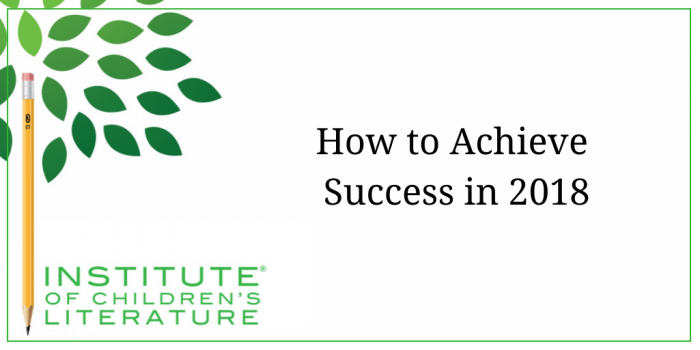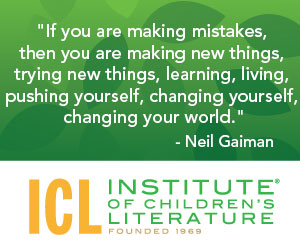1000 N. West Street #1200, Wilmington, DE 19801
© 2024 Direct Learning Systems, Inc. All rights reserved.

We teach our students how to write and get published!
View our Course Catalog >

Before you begin looking at goal steps for 2018, decide what your dream for 2018 is first.
The Difference Between Dreams and Goals
A dream is something you’d very much like to see occur, but which is at least partially dependent upon something other than your actions. It’s a dream because whether or not it happens is not totally up to you. Whether or not you get published by an established publisher depends upon such a publisher finding your manuscript a good match for their list. Signing with a hardworking and competent agent depends upon an agent of that sort falling in love with your work and believing they have the contacts to get that work published. Self-publishing and seeing a lot of sales from the self-publishing depends upon people buying the book, something you have limited control over (limited because you can increase your chances with knowledge of how to set yourself up for successful sales through keywords, etc., which you can learn on your own or through courses like Amazon Sales Secrets.) Whenever the thing you want to have happen cannot be reached solely by your choices/efforts, it’s a dream and not a goal.
But the wonderful thing about dreams is there are absolutely things you can do to make them more likely to come true. And identifying those things and doing them will be your best goals for the new year.
Step One: Assess Your Weaknesses
First, you need to understand your weaknesses. And that often needs the help of someone else (someone honest). You might get that kind of help free in a critique group or with a critique partner. You might get that kind of help by paying for a critique with an established writer or editor. (Of course I’d be remiss if I didn’t mention that we here at IFW have a critique service!) Tell the person upfront that your goal for the critique is identifying your writing weaknesses (patterns of problems) even more than improving this one piece. Improving one piece is good since it can lead to publication of that one piece, but identification of your specific writing weaknesses can help you improve everything you write, thereby leading to increased publication possibilities for everything.
The next step toward success as a writer is nearly always doing things to make you a better writer. Did you learn from your critique (or did you already know) that you have issues with grammar? Make the choice to finally master grammar. That can be your writing goal. If you have issues with believable dialogue or you feel your plots tend to be weak, the very best thing you can choose as a writing goal is to improve in those areas. Putting anything above your increased mastery of your craft is going to undermine your dreams every time. No matter how well you understand publishing, your efforts will always be hampered if you ignore the improvement of your craft.
Once you know your weakness, break down what you need to do to overcome it. You can use a search engine to find a wealth of free writing advice on that one aspect of writing. An abundance of advice, exercises, and writing prompts is out there. If you want targeted, more personal, and/or one-on-one help, you can join a membership like The Writers’ Block, which provides support, inspiration, and access to help you can’t find elsewhere. Sometimes you can even find writing books focused on your specific weakness. You can take classes or attend workshops or hunt down podcasts on the subject you’re seeking to improve. You can often find exercises to help you with that issue. And it can be good to check on your improvement periodically by taking something to your critique group (or hiring a critique) with a request to comment on that specific element. That should help you see how things are going in your effort to improve.
Rejection Does Not Equal Condemnation
Basically the steps for improving your chances break down into two types: education and action.
First, you need to know more about the business of publication. (If your face wrinkled up at that, I feel your pain. It’s not my favorite part either). If you want to find an agent, you need to:
(1) know what agents do and don’t do,
(2) know which agents are out there looking for the sort of things you write, and
(3) research all you can about those agents.
Then you need to take action by contacting the specific agents who will be best for you (and contacting those agents in the way they most want contact). Scatter-shooting your manuscript to every agent possible will waste your time and theirs. Also, it will increase your odds of being overwhelmed by the process. If you send your manuscript to 30 agents and they all reject it, you’re going to feel pretty defeated. But what if you could’ve sent the manuscript to only two agents who might have considered it? It’s not surprising that with 30 rejections you’re worn out and feeling defeated. You might even want to give up, even though there are still a dozen better matches for your manuscript out there. Exhaustion and dejection are serious problems once you start submitting. And submitting to people who were bad matches will leach your positive energy for action.
The same is true of querying or submitting your manuscript to a publisher (if you’re seeking submission without an agent, which is definitely possible). Here’s a small speck of truth for you. You know how Harry Potter was rejected by a whole bunch of publishers before it was published? Well, if it had been picked up by a publisher that was flatly incapable of handling a story like that, it would never have become the phenomenon it went on to be. Every publisher isn’t a good match for every fantastic book. Good and bad aren’t the only criteria upon which a publisher makes a decision. Rejection means your book won’t work in their list, not “your book stinks.” That’s why massively successful, well written books get rejection letters. It isn’t because editors are idiots. It’s because there is a lot more involved in acceptance than good/bad. And that means, we need to remind ourselves constantly that rejection does not equal condemnation.
So take time to study the markets before you submit. Look at their books.
Really, look at them.
Look at the covers.
Read the blurbs.
Ask yourself: what kinds of books are these? What do they have in common? What are the books saying about the publisher and where they view their slice of the huge world of publishing?
Then, does your book fit into that?
Sometimes it can be as simple as “Hmmm, 95% of their books are nonfiction, and the only fiction books they have are historical. My contemporary novel doesn’t seem like a good fit.” Sometimes it can be a little more complicated, “All the blurbs make these books sound like they’d be great action movies. My book is so much quieter and doesn’t seem like a good fit.”
Many publishers won’t be a good fit. But some will. And you really only need one publisher for one manuscript. Don’t be freaked out if there are only a few good fits. Take time to learn everything you can about those few. Do they have a solid reputation? Have I ever seen any of their books on book lists or talked about online? Does my local book store or library system carry any of their books? Keep in mind, the fewer people who are coming into contact with their books, the fewer sales they’re likely to be getting. Be forewarned with a realistic view of what your publishing experience with that publisher is likely to be and you’ll be much less likely to be upset later.
Goals are Incremental
When you start thinking about working on your craft or studying to know more about publishing, it can feel a little overwhelming. The key is to remember that goals are made up of steps. You may be looking at a long staircase, but you don’t need to jump to the top of it. You only need to take one step at a time. So break down the things you need to do into manageable bites that can fit within your available time.
One goal might be: “Go to the store and buy an agent guide.” Then your next step might be “find information on three agents from the list.” Make your steps manageable and keep in mind that you don’t have to tackle all of them at once. You are working on your dream for the year, so take only today’s steps towards that dream.
So figure out what you want, look at what you need to do to increase your chance of getting it, and break down steps to do your part, and you might just find that 2018 is a year that you see a dream come true. I know I’m going to be doing the same.
With over 100 books in publication, Jan Fields writes both chapter books for children and mystery novels for adults. She’s also known for a variety of experiences teaching writing, from one session SCBWI events to lengthier Highlights Foundation workshops to these blog posts for the Institute of Children’s Literature. As a former ICL instructor, Jan enjoys equipping writers for success in whatever way she can.
1000 N. West Street #1200, Wilmington, DE 19801
© 2024 Direct Learning Systems, Inc. All rights reserved.
1000 N. West Street #1200, Wilmington, DE 19801
© 2024 Direct Learning Systems, Inc. All rights reserved.
1000 N. West Street #1200, Wilmington, DE 19801
© 2024 Direct Learning Systems, Inc. All rights reserved.